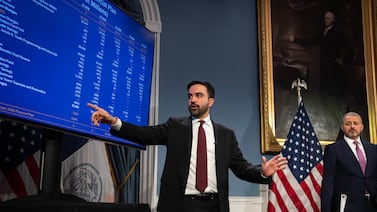Sign up for Chalkbeat Detroit’s free newsletter to keep up with the city’s public school system and Michigan education policy.
Proposed cuts to federal funding for local libraries could end essential services for Michigan students, particularly in rural and impoverished communities, according to state officials.
The Trump administration’s proposed 2025-26 budget would eliminate the federal department that provides funds to state library agencies. The cuts would mean the loss of nearly $4.8 million for the Library of Michigan, as well as grants that support Native American libraries in the state. The funding provides services that support K-12 students, such as early literacy programs, as well as access to the internet, technology, testing materials, tutorials, and online databases.
While most of the state’s library dollars come from local sources, rural, small, and lower-income communities struggle to raise enough revenue to maintain basic services and must rely on federal funds, said Diane Golzynski, deputy superintendent of business, health, and library services for the Michigan Department of Education, during a State Board of Education meeting on Tuesday.
Potential cuts to statewide library services come as the number of school librarians in the state are dwindling and gaps in student literacy achievement are widening.
On March 14, President Donald Trump signed an executive order calling to eliminate funding for the federal Institute of Museum and Library Services – the largest source of funding for state library agencies– as well as several other agencies.
Since then, 21 states, including Michigan, sued the federal government arguing the cuts would effectively dismantle the Institute of Museum and Library Services and two other agencies. The complaint argues that the executive order violated federal law because the institutions were created and funded by Congress.
A federal judge earlier this month issued a preliminary injunction in the case, temporarily preventing the cuts.
The Library of Michigan recently was notified it will receive federal funding already granted in a contract through the end of September 2026, said State Librarian Randy Riley during the board meeting.
“But after that, everything’s up for grabs,” he said, adding that the cuts proposed in Trump’s budget “would be terrible for what we do.”
Riley said there’s a risk that the statewide public database services the Library of Michigan provides – including the Michigan eLibrary, which gives access to online books, and the Michigan eLibrary Catalog, which lets residents order physical copies of books from collections in other parts of the state to their local libraries – could end or be significantly altered.
Or, the state might need to increase funding for local libraries to replace potential federal funding shortfalls in the future, Riley said.
The role of Michigan’s 397 local libraries in K-12 literacy has become more important over the years, advocates say, as school libraries have become more rare.
The number of school libraries in the state is unclear. However, data on the number of full-time certified librarians employed by districts suggests funding for school libraries has declined significantly in recent years.
The state ranks 47th in the nation for school librarians per student, according to the most recently available data analysis. The number of school librarians in the state dropped 73% between 2000 and 2016 – one of the biggest declines in the country.
Decades of research show access to well-sourced libraries and certified librarians help improve student outcomes.
In a recent national assessment, Michigan ranked 44th in the nation for fourth-grade reading.
Hannah Dellinger covers K-12 education and state education policy for Chalkbeat Detroit. You can reach her at hdellinger@chalkbeat.org.






